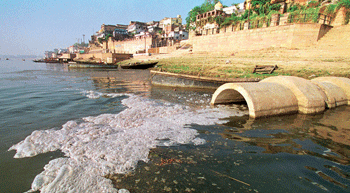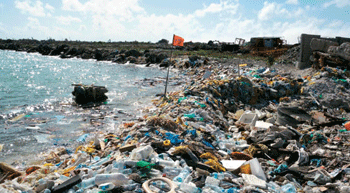Holy Ganga- the river which has been bestowed with abundant funds, yet remains a toxic cocktail. The Central Government has allocated an additional amount of Rs 200 crore
FlashNews:
Vizhinjam Expansion Strengthens India’s Maritime Competitiveness: Sonowal
Tata Power Odisha Discoms Secure Top National Rankings for Third Consecutive Year
SDHI Secures $227 Million Chemical Tanker Deal, Revives India’s Commercial Shipbuilding
India’s Energy Transition Sets Global Pace: Pralhad Joshi at Davos
IWDC Clears ₹15 Billion Projects to Boost Green Mobility, Cargo and River Tourism
World Bank Approves $815 Million Financing for Tata Power-DGPC Dorjilung Hydropower Project in Bhutan
Indian Railways Deploys Humanoid Robot ASC ARJUN at Visakhapatnam for Smart Station Security
India’s Power Grid Crosses 500,000 Circuit Km, Marks 71.6% Growth Since 2014
India Inc Optimistic on Growth, Flags Infrastructure, Defence and Export Priorities: FICCI Survey
NHAI, Konkan Railway Ink MoU to Boost Integrated Road‑Rail Infrastructure Development
DGCA Digitises Pilot Licensing with Electronic ATPL Services to Strengthen Aviation Ecosystem
Power Minister Calls for Financially Strong Discoms to Drive India’s Energy Future
BLR Airport Launches Gate Z, India’s First Social Lounge Redefining the Airport Experience
MoPNG Highlights Financing Strength, Regulatory Reforms Ahead of New Upstream Bid Rounds
ABB India Modernises BPCL’s Vadinar‑Bina Pipeline for Uninterrupted Operations
Vaishnaw Projects 6-8% Growth, Highlights Reform Momentum at Davos
Aerem Solutions Secures $15 Million to Drive Distributed Solar Adoption Across India
India Showcases Energy Transition at Davos: Joshi Calls for Global Collaboration
Indian Railways Expands High-Speed Track Network, Boosts Safety with Modernisation
Home » STPs
Tag: STPs
Automatic Water Quality Monitoring on Ganga
Under the World Bank aided project Automatic Water Quality Monitoring has been setup under the NGRBA Project for the river Ganga at an estimated cost of Rs 94.45 crore approximately.
TN govt to set up three more sewage plants
The Tamil Nadu government is in the process of setting up three more sewage treatment plants (STPs) in Chennai. The plants would be set up in Villivakkam, with a capacity to process 135 million litre per day (mn ld) of sewerage, Sholinganallur (100 mn ld) and Navalur (6 mn ld)
Vox Pop: Experts provide solutions for urban wastewater management
From what model of PPP will work in our urban wastewater management to how they can move from a mostly secondary treatment to tertiary and make water viable, policymakers, city administrators and wastewater practitioners offer solutions.




